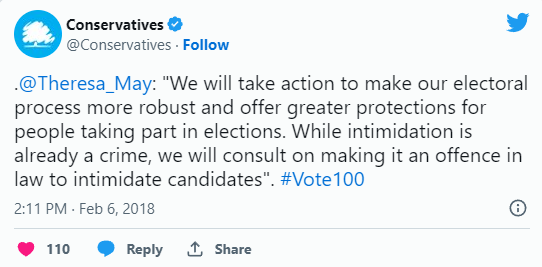Free speech, safe spaces and hypocrisy
The unedifying ‘scuffle’ at Jacob Rees-Mogg’s appearance at the University of the West of England has provoked a great deal of reaction – some of it distinctly over-the-top. Precisely what happened, who started the fight and why, remains a little unclear – and is not the topic of this post. It is Theresa May’s reaction, to suggest a new law to protect MPs against intimidation, that is more interesting for those of us who are interested in freedom of speech – not only in its practice but its purpose.
Safe Spaces can be a good thing
What the supporters of a law to protect MPs from intimidation might understand, if they thought a little further, is that safe spaces can be a good thing. If we want a civilised debate, if we want people not to be intimidated into silence, if we want to encourage those whose voices are rarely heard, then a supportive – or at the very least not threatening – environment really helps. Theresa May understands that for MPs – because she understands MPs, and supports them in that role. That much is easy – making the leap to understand that others need that protection and that safety too seems to be much harder.
Safe Spaces can be a bad thing
On the other hand, if the creation of a ‘safe space’ is to stop particular voices being challenged, it is not so clearly a good thing – and that may well be what happens at times. For debate to function, challenging needs to be possible – banning hecklers and protestors is not always a good thing. Drawing a line is not always easy – as the UWE fracas showed. The initial protest, and indeed Jacob Rees-Mogg’s first response to it, seemed relatively civilised and harmless. Protest is a critical part of freedom of speech – the vehemence with which authoritarian regimes deal with it should at least give pause for thought. The idea that Donald Trump might only visit the UK if Theresa May stops protests is not something we should accept, for example.
Safe Spaces for whom?
What should give us even more pause for thought is who we need to provide safe spaces for, and why – and this is where the idea that we should legislate for safe spaces for MPs whilst actively working against safe spaces for others feels particularly wrong. MPs already have plenty of ‘safe spaces’ to air their views. Parliament itself, for one. The studios of all the TV and radio broadcasters. Columns in major newspapers and magazines. Others – particularly vulnerable or marginalised people and groups – have almost no access to these. They have neither freedom of speech in practice nor safe spaces in which to hear others. They don’t have powerful friends and allies to open doors, provide platforms – or bring in legislation.
That is the thing about rights – and human rights in particular. The main need for those rights is for the relatively weak, to protect them from the relatively strong. People with strength and power already have many means to protect themselves – in free speech terms, they have many ways to express themselves and a ready audience to listen. For others none of that is true – and that is what we need to remember.
Free speech is not simple – it is messy and complicated, nuanced and difficult to find our way through. That complication needs to be taken on board – because free speech is also really important. We should be particularly wary of those proclaiming themselves champions of free speech – what they are championing is often at best an oversimplification, and often a complete distortion. In Theresa May’s case, it may be even worse. The kind of law envisaged would not support free speech – it would support the powerful against the weak. It should be thoroughly resisted.
This post was originally published on Dr Paul Bernal's personal blog: paulbernal.wordpress.com. It has been reproduced for Information Society Policy (ISP) @ UEA with Dr Paul Bernal's permission.

)
